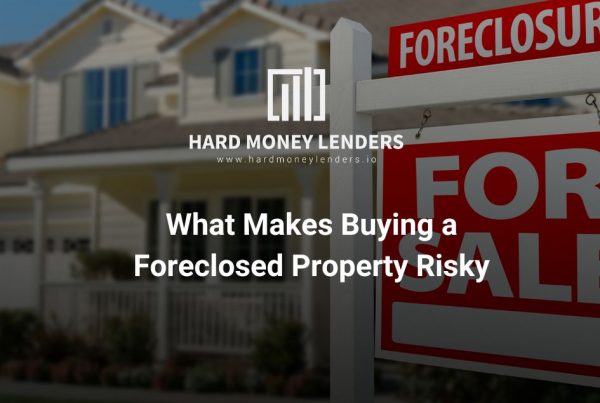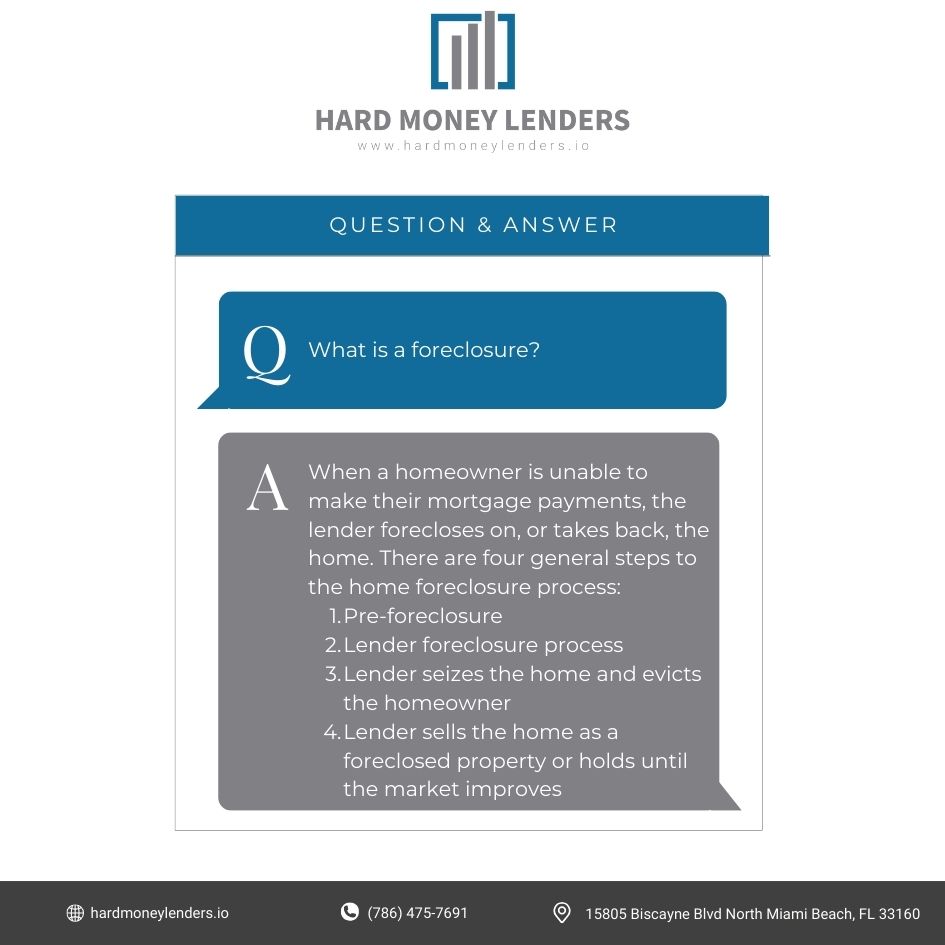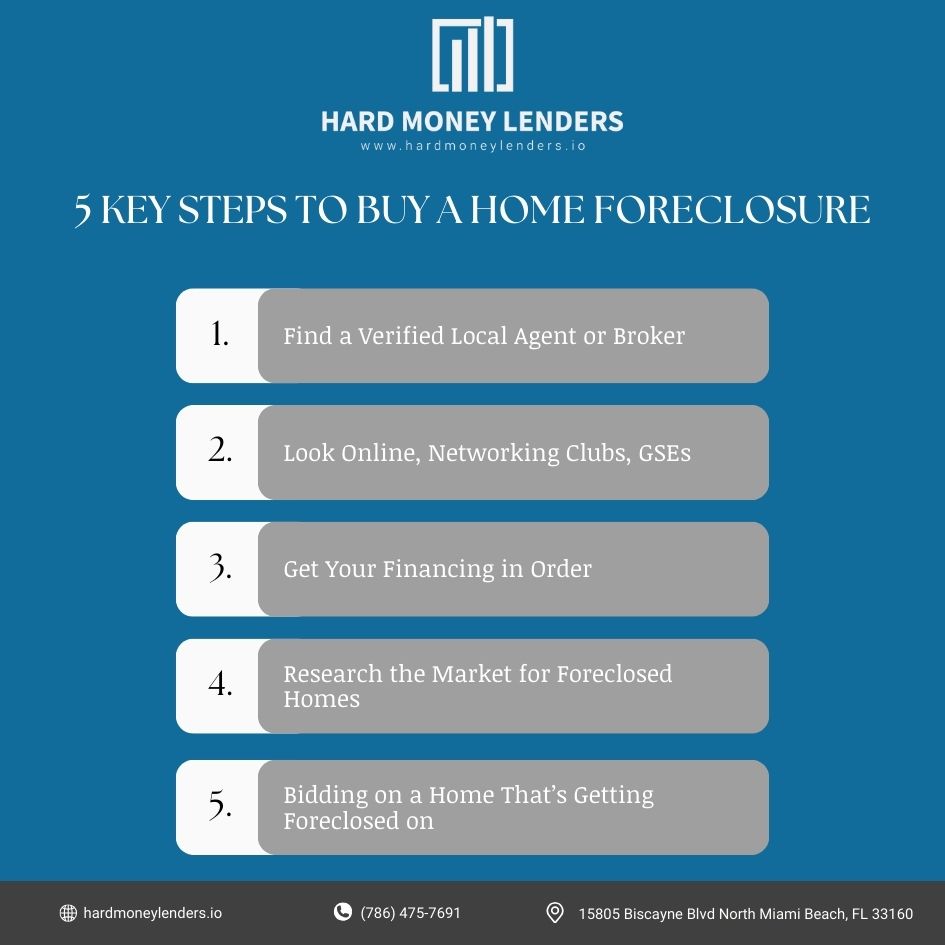What Makes Buying a Foreclosed Property Risky?

During the last housing market crash in 2008, home foreclosures nearly tripled. Real estate investors stepped into the market and scooped up foreclosed homes for much less than what the owners had originally paid. They turned them into rental homes and, when the housing market improved, investors sold them for substantial profits. When a property owner fails to pay property taxes or the mortgage, local governments or lenders initiate a foreclosure process to forcibly acquire ownership of the land and improvements in order to mitigate their losses. While no one has a crystal ball, it’s never too late to begin preparing for the next wave of home foreclosures, which are likely to arrive if, and when, the real estate market moves down. So, with that in mind, let’s take a look at what makes buying a foreclosed property so risky.
What is Foreclosure?

Foreclosure isn’t something any homeowner wants to go through. Unfortunately it affects hundreds of thousands of Americans every year. So how does the foreclosure process work?
Homeowners have to first default on their mortgage, failing to pay their required monthly payments. And it’s rare for lenders to begin foreclosure after just one late mortgage payment. Lenders usually offer alternatives during this period, including different payment plans to help the homeowners get back on track, keep their home, and keep paying their monthly mortgage bill.
If a borrower can’t come up with the funds to pay what he or she owes, a lender will issue a notice of default. This form will be sent to the mortgagee via a certified letter, and it typically gives a homeowner 90 days to pay off the most recent bill. This is the beginning of the formal process.
If the homeowner hasn’t come up with the money within 90 days of the notice of default, the lender may proceed with the foreclosure. Next comes a notice of sale, which will state that the trustee (the lender) will sell the home at auction within 21 days.
The home will be sold at a public auction to the highest bidder, who will have to pay the full amount of the bid immediately. This buyer will receive a trustee’s deed once the sale is complete, at which point he becomes the official owner.
Foreclosed Homes are Sold “as-is”
As much as we might like it to be true, there’s no such thing as having your cake and eating it too. Buying a foreclosed home is no exception, as they’re nearly always sold on an “as-is” basis.
What that means in practice is that what you see is what you get. Buyers of foreclosed homes can still conduct an inspection, but the seller, usually a bank or local government, isn’t obligated to make repairs, nor will the sales price be discounted to compensate you for repairs or improvements that need to be made.
Understand What You’re Getting into with a Foreclosed Home
When a homeowner is unable to make their mortgage payments, the lender forecloses on, or takes back, the home. There are four general steps to the home foreclosure process:
- Pre-foreclosure: the homeowner receives notice of a pending foreclosure action, but the lender hasn’t yet begun to foreclose.
- Lender foreclosure process: the lender begins the legal process to foreclose on the home, with the length of time and exact steps varying from state to state.
- Lender seizes the home and evicts the homeowner: by this point the homeowner has usually abandoned the property, sometimes taking with them as much as they can carry, including appliances, plumbing fixtures, light fixtures, and more.
- Lender sells the home as a foreclosed property or holds until the market improves: unless a real estate investor can make a deal with the bank ahead of time, the home will be sold at a foreclosure auction or held as “Real Estate Owned” until the market improves.
Risks and Rewards of Buying a Foreclosed Home
The amount of risk and potential reward of buying a foreclosed home can vary depending on which part of the foreclosure process the home is in.
Risks of Investing in a Foreclosed Home
- There’s a lot of competition to buy a foreclosure. Real estate investors, for instance, often bid cash for a foreclosed home to operate as an income property with no contingencies and no questions asked.
- The condition of a foreclosure home isn’t disclosed or guaranteed. Unlike buying a home listed on the MLS by a real estate agent, the bank isn’t required to disclose anything about the property to a buyer. That’s why it’s important to learn as much as possible about the house before you bid.
- Buying a foreclosed home doesn’t always make sense. Just because a home is being sold at a foreclosure auction doesn’t necessarily mean it’s a good deal. Some foreclosure homes have been completely trashed by the previous owner and require major repairs like new roofs or heating and air conditioning systems.
Rewards of Buying a Foreclosed Home
- It is possible to find deals. While some foreclosed homes require a lot of extra money to fix up, others can be purchased for below market value. Just be sure to do your due diligence and analyze the potential cap rate and return on investment.
- Foreclosed HUD homes can be great for owner-occupants. If you’re looking for a home to live in yourself, Housing and Urban Development homes that were financed through the FHA may be a good deal. They’re usually marketed to owner-occupants first, so there could be less competition if you act quickly.
- Add value with sweat equity. If you have the time and skills to do any required repair work yourself, you can save a lot of money instead of contracting the labor out. Your “sweat equity” drops straight to the bottom line, adding real equity and extra profit when the time comes to sell.
5 Key Steps to Buy a Home Foreclosure

Now that you understand the risks and rewards, here are the 5 key steps to buying a home foreclosure.
Step 1: Find a Verified Local Agent or Broker
When it comes to purchasing a foreclosed home, it can be a complicated process. That’s why it’s essential to team up with a local real estate agent or broker who specializes in foreclosures. These professionals have strong relationships with banks and can access listings that are not yet available publicly.
They possess expertise about the specific legal and financial nuances that come with foreclosures in your area, and they can guide you through the process from beginning to end. It’s important to look for agents with a proven track record of experience and satisfied clients when dealing with foreclosed properties. These agents can provide you with valuable insights and assist you in avoiding common pitfalls associated with buying these types of homes.
Step 2: Other Ways to Find Foreclosed Homes
Aside from working with a real estate agent, there are several other methods to find foreclosed homes:
- Online Property Websites: Websites like Zillow, RealtyTrac, and Auction.com list foreclosed properties. These platforms often provide detailed information about the property, including its status and legal particulars.
- Search Engines: Simply searching “foreclosures” or “REO properties” followed by your location can yield a variety of resources, including listings and advice on purchasing these types of properties.
- Investor Networking Clubs: Joining local real estate investment groups or clubs can provide connections with other investors who might have leads on foreclosed properties.
- Bank Websites: Major banks like Wells Fargo and Bank of America have sections on their websites dedicated to bank-owned properties. These listings are directly from the source, potentially reducing the buying competition.
- Government-Sponsored Enterprises: Websites for Fannie Mae and Freddie Mac offer lists of foreclosed homes financed through their programs, often at competitive prices.
Step 3: Get Your Financing in Order
Securing financing in advance is essential when looking to purchase a foreclosed home, especially since these sales often require quick payment. Steps to take include:
- Preapproval Letter: Before shopping for a foreclosed home, obtain a preapproval letter from a lender. This letter indicates how much money you can borrow based on your financial background and credit score, which is crucial when making an offer on a home.
- Understand Financing Restrictions: Be aware that the banks selling the foreclosed properties typically do not finance the purchase. You’ll likely need to secure a loan from another lender or have the cash ready for the purchase.
- Explore Various Financing Options: Investigate different types of loans suitable for purchasing foreclosed properties. Traditional mortgages, FHA 203(k) loans for homes needing repairs, and hard money loans for quick financing are all options to consider.
Step 4: Research the Market for Foreclosed Homes
Research the home foreclosure market in your area to understand what price you should be paying before you bid. Your real estate agent can provide you with “comps” showing recent sales transactions. Good online sites to use include Zillow for home listings and RENTCafé if you’ll be using the home as a rental property.
Step 5: Bidding on a Home That’s Getting Foreclosed on
There are three ways to bid on a home that’s getting foreclosed on:
- Pre-foreclosure property where the home foreclosure is pending. You’ll be negotiating with both the seller and the lender, and sometimes the bank is more motivated to do a deal at this point rather than going through the expense of foreclosing on the property.
- Public foreclosure auction where you’ll be competing with other investor-buyers. Most offers in a foreclosure auction will be made in cash, with the property purchased “as-is”.
- Bank-owned properties have been foreclosed on but haven’t yet gone to auction. Some real estate investors consider this the best way to buy a foreclosed home. The bank has a non-productive asset on its balance sheet and your strong offer may convince them to sell the property to you instead of going to auction.
Financing Options for Foreclosed Homes
Financing a foreclosed property can be different from traditional home buying due to the potential risks and condition of the property. Here’s a rundown of the most common financing options:
- Traditional Mortgages: Not all foreclosed homes qualify for traditional mortgages, especially if they’re in poor condition. Lenders may require a property to be habitable to approve a mortgage. For properties that do qualify, traditional mortgages might offer the best interest rates and terms.
- Hard Money Loans: These are short-term loans from private investors or companies, often used by house flippers or those unable to secure traditional financing. Hard money loans can be approved quickly but usually have higher interest rates and shorter repayment periods.
- Lines of Credit: If you have equity in another property, a home equity line of credit (HELOC) could be a flexible way to finance a foreclosure. This option provides access to funds up to a certain limit and can be used when needed.
- FHA 203(k) Loans: This type of loan is designed for properties that need significant repairs. It allows the buyer to finance both the purchase and the cost of renovations with a single mortgage.
- Cash Payments: Many foreclosure auctions require payment in cash. This method is straightforward but requires having a significant amount of liquid assets.
 Expert Tips for First-Time Foreclosure Buyers
Expert Tips for First-Time Foreclosure Buyers
For those venturing into the foreclosure market for the first time, it’s crucial to approach with caution and preparedness. Here are some expert tips tailored for first-time buyers:
- Understand the Process: Familiarize yourself with how foreclosures work in your state, as the rules can vary significantly. Know the stages of foreclosure: pre-foreclosure, auction, and bank-owned properties.
- Thorough Inspections Are Key: Always conduct a detailed inspection of the property. This can be challenging as access before auctions might be restricted. If possible, bring a contractor or a home inspector who can identify potential problems and estimate repair costs.
- Assess Renovation Needs Realistically: Understand what renovations are necessary to make the property livable and valuable. Calculate the costs of these renovations meticulously and add a contingency budget for unforeseen expenses.
- Develop a Solid Bidding Strategy: Learn about the bidding process and set a strict budget for yourself. Remember, auctions can be competitive, and it’s easy to get caught up in the heat of the moment.
- Seek Professional Advice: Consult with real estate agents or attorneys who specialize in foreclosures. They can offer valuable insights and guidance throughout the buying process.
- Consider the Aftermath: Plan for what comes after purchasing. This includes property taxes, insurance, ongoing maintenance, and the strategy for selling or renting out the property.
Final Thoughts on What Makes Buying a Foreclosed Property Risky
There’s no doubt that buying foreclosed homes can be a profitable endeavor for real estate investors if done properly. There are deals to be had! You have to be organized and know your local market inside and out.
Make sure you have your team behind you and ready to take action when the time comes. And always remember, foreclosure homes are sold “as-is” so due diligence is doubly important for this type of real estate transaction.
FAQs
What are the disadvantages of buying a foreclosed property?
Buying a foreclosed property often means dealing with potential unknowns. These homes are typically sold “as-is,” which means no repairs will be made before the sale, and there’s no guarantee on the condition of the property. Buyers might encounter hidden damages, such as issues with plumbing, electrical systems, or even structural integrity. Additionally, there may be unresolved liens or disputes over the property title, which can complicate the buying process.
Do banks usually negotiate on foreclosures?
Banks may be open to negotiations on foreclosed properties, but it largely depends on how long the property has been on the market and the bank’s inventory levels. If a property has not attracted interest for an extended period, the bank might be more willing to negotiate to remove it from their books. However, if the property is in a competitive market or in demand, the bank might hold firm on the price.
Why do banks prefer foreclosure to short sale?
Banks might prefer foreclosures over short sales because it allows them to regain control of the property more directly. In a short sale, the bank must deal with the homeowner and potential buyers, which can extend the process and involve more negotiations. Foreclosure gives the bank the ability to sell the property on their terms and timeline, often making it a quicker, if not always simpler, resolution to a bad loan.
How to negotiate on a foreclosure?
Negotiating a foreclosure purchase involves a few strategic steps:
- Get a pre-approval letter: Demonstrating that you are financially capable and serious about the purchase can put you in a favorable position.
- Research the property’s value and condition: Understanding how much repair the property will need and its market value will help you make a realistic offer.
- Submit a competitive but reasonable offer: Base your offer on the condition of the property and comparable sales in the area.
- Be prepared for counteroffers: Banks may counteroffer, so be ready to negotiate terms or adjust your offer accordingly.
- Work with an experienced agent: A real estate agent experienced in foreclosures can provide valuable guidance throughout the negotiation process.

Yuval Elkeslasi is a distinguished professional in the finance industry, celebrated for his pioneering strategies and significant contributions as the leader of Hard Money Lenders IO. Hailing from Queens, New York, Yuval has built an impressive career, transforming the lending landscape through his expertise and visionary approach. Yuval Elkeslasi
attended Florida State University, where he obtained a bachelor’s degree in Finance. This academic foundation provided him with the necessary skills and knowledge to thrive in the competitive financial arena. Yuval’s tenure at Hard Money Lenders IO is marked by numerous pioneering accomplishments. He has introduced a variety of loan programs designed to cater to specific client requirements, including fix and flip loans, new construction financing, cash-out refinancing, rental property loans, and specialized financing for luxury items like yachts. Among Yuval’s significant achievements is securing an $8 million construction loan for a spec home builder in Port Royal, Naples. He also orchestrated the financing for a prestigious 72’ 2024 Viking Convertible yacht valued at $7.2 million. These transactions demonstrate Yuval’s adeptness at navigating complex financial landscapes and delivering exceptional results.
